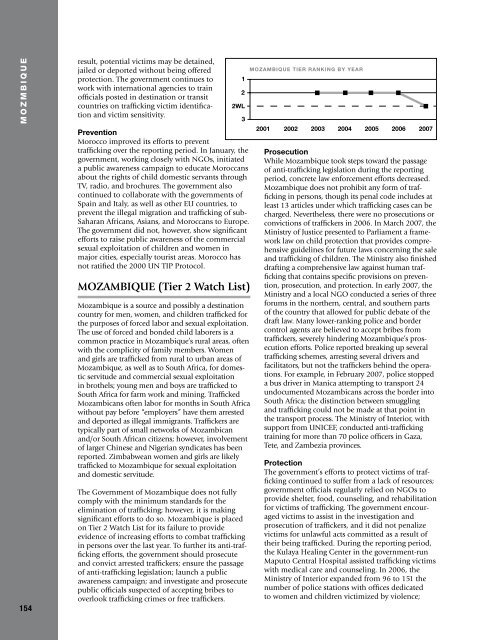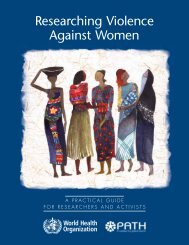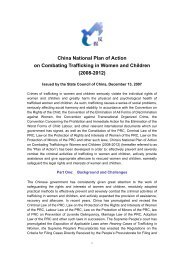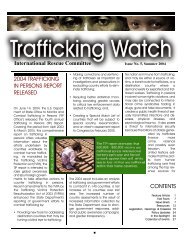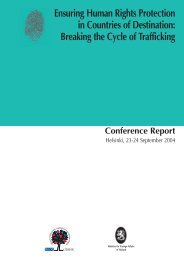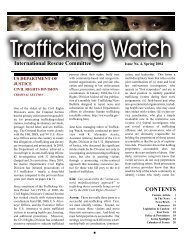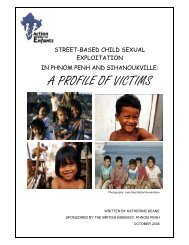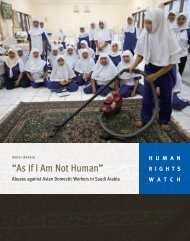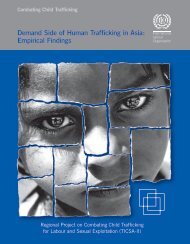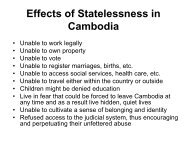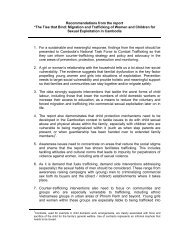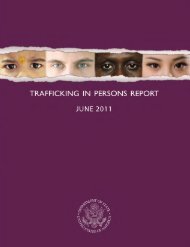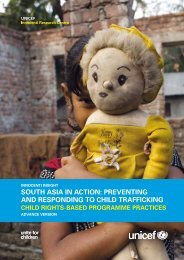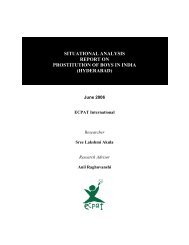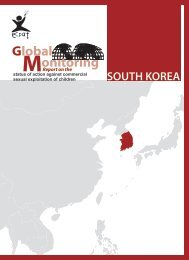2007 Trafficking in Persons Report - Center for Women Policy Studies
2007 Trafficking in Persons Report - Center for Women Policy Studies
2007 Trafficking in Persons Report - Center for Women Policy Studies
You also want an ePaper? Increase the reach of your titles
YUMPU automatically turns print PDFs into web optimized ePapers that Google loves.
M O Z M B I Q U E<br />
154<br />
result, potential victims may be deta<strong>in</strong>ed,<br />
jailed or deported without be<strong>in</strong>g offered<br />
protection. The government cont<strong>in</strong>ues to<br />
work with <strong>in</strong>ternational agencies to tra<strong>in</strong><br />
officials posted <strong>in</strong> dest<strong>in</strong>ation or transit<br />
countries on traffick<strong>in</strong>g victim identification<br />
and victim sensitivity.<br />
Prevention<br />
Morocco improved its ef<strong>for</strong>ts to prevent<br />
traffick<strong>in</strong>g over the report<strong>in</strong>g period. In January, the<br />
government, work<strong>in</strong>g closely with NGOs, <strong>in</strong>itiated<br />
a public awareness campaign to educate Moroccans<br />
about the rights of child domestic servants through<br />
TV, radio, and brochures. The government also<br />
cont<strong>in</strong>ued to collaborate with the governments of<br />
Spa<strong>in</strong> and Italy, as well as other EU countries, to<br />
prevent the illegal migration and traffick<strong>in</strong>g of sub-<br />
Saharan Africans, Asians, and Moroccans to Europe.<br />
The government did not, however, show significant<br />
ef<strong>for</strong>ts to raise public awareness of the commercial<br />
sexual exploitation of children and women <strong>in</strong><br />
major cities, especially tourist areas. Morocco has<br />
not ratified the 2000 UN TIP Protocol.<br />
MOZAMBIQUE (Tier 2 Watch List)<br />
Mozambique is a source and possibly a dest<strong>in</strong>ation<br />
country <strong>for</strong> men, women, and children trafficked <strong>for</strong><br />
the purposes of <strong>for</strong>ced labor and sexual exploitation.<br />
The use of <strong>for</strong>ced and bonded child laborers is a<br />
common practice <strong>in</strong> Mozambique’s rural areas, often<br />
with the complicity of family members. <strong>Women</strong><br />
and girls are trafficked from rural to urban areas of<br />
Mozambique, as well as to South Africa, <strong>for</strong> domestic<br />
servitude and commercial sexual exploitation<br />
<strong>in</strong> brothels; young men and boys are trafficked to<br />
South Africa <strong>for</strong> farm work and m<strong>in</strong><strong>in</strong>g. Trafficked<br />
Mozambicans often labor <strong>for</strong> months <strong>in</strong> South Africa<br />
without pay be<strong>for</strong>e “employers” have them arrested<br />
and deported as illegal immigrants. Traffickers are<br />
typically part of small networks of Mozambican<br />
and/or South African citizens; however, <strong>in</strong>volvement<br />
of larger Ch<strong>in</strong>ese and Nigerian syndicates has been<br />
reported. Zimbabwean women and girls are likely<br />
trafficked to Mozambique <strong>for</strong> sexual exploitation<br />
and domestic servitude.<br />
The Government of Mozambique does not fully<br />
comply with the m<strong>in</strong>imum standards <strong>for</strong> the<br />
elim<strong>in</strong>ation of traffick<strong>in</strong>g; however, it is mak<strong>in</strong>g<br />
significant ef<strong>for</strong>ts to do so. Mozambique is placed<br />
on Tier 2 Watch List <strong>for</strong> its failure to provide<br />
evidence of <strong>in</strong>creas<strong>in</strong>g ef<strong>for</strong>ts to combat traffick<strong>in</strong>g<br />
<strong>in</strong> persons over the last year. To further its anti-traffick<strong>in</strong>g<br />
ef<strong>for</strong>ts, the government should prosecute<br />
and convict arrested traffickers; ensure the passage<br />
of anti-traffick<strong>in</strong>g legislation; launch a public<br />
awareness campaign; and <strong>in</strong>vestigate and prosecute<br />
public officials suspected of accept<strong>in</strong>g bribes to<br />
overlook traffick<strong>in</strong>g crimes or free traffickers.<br />
Prosecution<br />
While Mozambique took steps toward the passage<br />
of anti-traffick<strong>in</strong>g legislation dur<strong>in</strong>g the report<strong>in</strong>g<br />
period, concrete law en<strong>for</strong>cement ef<strong>for</strong>ts decreased.<br />
Mozambique does not prohibit any <strong>for</strong>m of traffick<strong>in</strong>g<br />
<strong>in</strong> persons, though its penal code <strong>in</strong>cludes at<br />
least 13 articles under which traffick<strong>in</strong>g cases can be<br />
charged. Nevertheless, there were no prosecutions or<br />
convictions of traffickers <strong>in</strong> 2006. In March <strong>2007</strong>, the<br />
M<strong>in</strong>istry of Justice presented to Parliament a framework<br />
law on child protection that provides comprehensive<br />
guidel<strong>in</strong>es <strong>for</strong> future laws concern<strong>in</strong>g the sale<br />
and traffick<strong>in</strong>g of children. The M<strong>in</strong>istry also f<strong>in</strong>ished<br />
draft<strong>in</strong>g a comprehensive law aga<strong>in</strong>st human traffick<strong>in</strong>g<br />
that conta<strong>in</strong>s specific provisions on prevention,<br />
prosecution, and protection. In early <strong>2007</strong>, the<br />
M<strong>in</strong>istry and a local NGO conducted a series of three<br />
<strong>for</strong>ums <strong>in</strong> the northern, central, and southern parts<br />
of the country that allowed <strong>for</strong> public debate of the<br />
draft law. Many lower-rank<strong>in</strong>g police and border<br />
control agents are believed to accept bribes from<br />
traffickers, severely h<strong>in</strong>der<strong>in</strong>g Mozambique’s prosecution<br />
ef<strong>for</strong>ts. Police reported break<strong>in</strong>g up several<br />
traffick<strong>in</strong>g schemes, arrest<strong>in</strong>g several drivers and<br />
facilitators, but not the traffickers beh<strong>in</strong>d the operations.<br />
For example, <strong>in</strong> February <strong>2007</strong>, police stopped<br />
a bus driver <strong>in</strong> Manica attempt<strong>in</strong>g to transport 24<br />
undocumented Mozambicans across the border <strong>in</strong>to<br />
South Africa; the dist<strong>in</strong>ction between smuggl<strong>in</strong>g<br />
and traffick<strong>in</strong>g could not be made at that po<strong>in</strong>t <strong>in</strong><br />
the transport process. The M<strong>in</strong>istry of Interior, with<br />
support from UNICEF, conducted anti-traffick<strong>in</strong>g<br />
tra<strong>in</strong><strong>in</strong>g <strong>for</strong> more than 70 police officers <strong>in</strong> Gaza,<br />
Tete, and Zambezia prov<strong>in</strong>ces.<br />
Protection<br />
The government’s ef<strong>for</strong>ts to protect victims of traffick<strong>in</strong>g<br />
cont<strong>in</strong>ued to suffer from a lack of resources;<br />
government officials regularly relied on NGOs to<br />
provide shelter, food, counsel<strong>in</strong>g, and rehabilitation<br />
<strong>for</strong> victims of traffick<strong>in</strong>g. The government encouraged<br />
victims to assist <strong>in</strong> the <strong>in</strong>vestigation and<br />
prosecution of traffickers, and it did not penalize<br />
victims <strong>for</strong> unlawful acts committed as a result of<br />
their be<strong>in</strong>g trafficked. Dur<strong>in</strong>g the report<strong>in</strong>g period,<br />
the Kulaya Heal<strong>in</strong>g <strong>Center</strong> <strong>in</strong> the government-run<br />
Maputo Central Hospital assisted traffick<strong>in</strong>g victims<br />
with medical care and counsel<strong>in</strong>g. In 2006, the<br />
M<strong>in</strong>istry of Interior expanded from 96 to 151 the<br />
number of police stations with offices dedicated<br />
to women and children victimized by violence;


